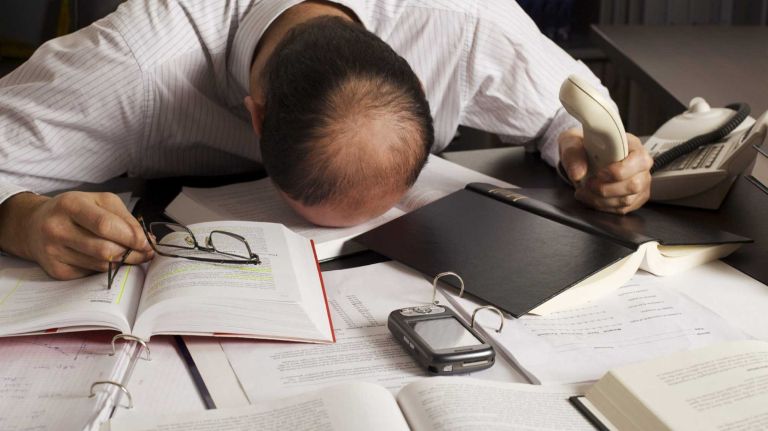
Florida State University researchers found that more than one third of workers eat their lunch at their desks. I would imagine that at least an equal number of workers work on business related tasks and projects after work while on personal time and vacation time. And yet those same researchers concluded that top performers tend to work no more than 4 ½ hours per day.
What does this tell us? Well even if their research were inaccurate, it would support the general agreement by researchers and managers alike that the value of work produced is more important than the volume of work or the number of hours worked.
But there’s more to it than the fact that working on important, goal-related tasks to the exclusion of unimportant, “nice to do” tasks would make you a top performer. Working long hours without a break, putting in overtime, working through lunch hours and coffee breaks all help to reduce personal productivity. Not to mention its negative impact on your health.
Busyness is a form of mental laziness because you don’t have to think; you just to keep working. And thinking is the most important part of any job.
I maintain that managers and others are working longer today because the impressive chunks of time saved by technology and its various devices are dwarfed by the time lost by the reduced efficiency of our brains.
Technology itself is responsible for some of that inefficiency since it has taken over so many things that we previously did mentally that our neural connections have weakened in those areas. If you don’t use it, you lose it. The rest of the inefficiency is a result of our attempt to play “catch-up” by working longer.
We could easily compensate for any loss, and improve the efficiency of our brains to an even higher level than before; but we are so busy working we don’t have time to do so. It appears to be a catch 22.
But suppose we decided to take a few vacation breaks of an hour or more at a time in spite of our ever-expanding “to do” list. Pretend that you have suddenly taken ill, which could actually happen if you kept up this pace much longer. What would you do during these imaginary “sick breaks”? Here are a few suggestions. They all involve healthy living – a lifestyle makeover and a brain tune-up. Treat your brain and body with the same care as you would your new car or electronic toys.
Get more sleep.
Insufficient sleep slows reasoning ability, logical thinking and reaction time as well as motor skills. People who brag that they get by on 5 hours a night and that it doesn’t affect their productivity or energy level at all, don’t realize that it’s their sleep-deprived brain that’s telling them that. Get a minimum of 7 hours sleep a night. Less than 6, and you’re sleep deprived. My eBook, Sleep: a time management strategy, published by Book boon.com, explores this topic in detail.
Spend more time with people and less time alone.
Staying socially engaged affects your cognitive functioning as well. Research by Sheldon Cohen of Carnegie Mellon University indicates that the more social connections you have, the greater your ability to fight infection. And an article in the January, 2018 issue of Prevention Guide claims that socializing, even online, keeps your cells from aging too fast.
Exercise on a regular basis.
Physical exercise not only increases circulation of nutrient-carrying blood to the brain, it also reduces the risk of dying from heart disease, stroke, diabetes – and improves mood, muscles, bones and lung capacity. One study indicated that six months of aerobic exercise improved cognitive functioning. John Ratey expressed it simply in his book when he said “sedentary behaviour causes brain impairment.”
Boost your brain power.
Good old-fashioned reading, writing and arithmetic stimulate the brain and make it grow in every conceivable way. Don’t outsource all your mental chores to computers. Keep mentally active, whether it is by doing crossword puzzles, discussing the weather, and writing, reading or working on your income tax. I find that memory training – using gimmicks, acronyms, visualization etc. to memorize things – really helps keep my mind active. And if you really want to exercise your brain, try learning to play a musical instrument or learning a second language.
Maintain lifelong learning.
Our chance of developing Alzheimer’s drops 17% for every year of education beyond high school, according to John Ratey, co-author of the book, Go wild: free yourself from the afflictions of civilization. It’s not the education, it’s the forced thinking – so commit yourself to lifelong learning. Lifelong learning could delay the onset of cognitive impairment by 3 to 8 years. You don’t have to go back to school or take courses in order to keep learning. You can do it by reading newspapers, listening to CDs, keeping up to date with world events, discussing current events with friends and so on.
Plug into nature.
It is a fact that trees, grass, plants and vegetation affects us both physically and mentally. And sunlight causes the body to release serotonin – one of the reasons you feel in a good mood on sunny days. It also releases endorphins, which lower pain, and acetylcholine, which is essential for learning. It stands to reason that your productivity as well as your personal energy will improve if you are bathed in natural sunlight rather than the unnatural florescent and incandescent lighting of most offices and working areas. Recent studies found that urban green spaces, such as plants and gardens, also improve cognitive development. Studies have shown that the presence of potted plants, for example, improves productivity, creativity, performance and learning ability. And it’s no coincidence that blue and green, the colours of most frequently found in nature, have also been found to be the most effective in maintaining calm and general well-being as well as stimulating personal productivity.
It’s not just time that you are depleting when you work on tasks and projects, it’s energy as well. And we all have a limited supply that has to be replenished frequently. You are doing that when you take regular breaks and participate in the above activities. If you fail to do so, your brain and body are not working on all cylinders and both you and your work will pay the consequences. Overwork doesn’t work.
Note: Harold Taylor will be presenting a free 20-minute webinar on Wednesday, October 2, 2019 at 8 a.m. Eastern Time, sponsored by Bookboon.com. To register, click here.


Recent Comments